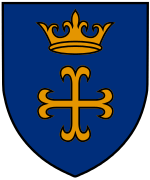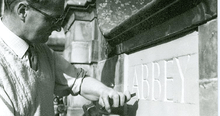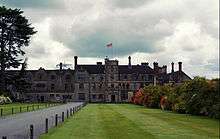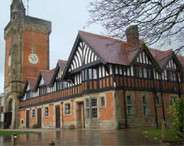Worth School
 | |
| Motto |
Latin: Gloria Dei est homo bene vivit (The glory of God is a person fully alive) [1] |
|---|---|
| Established | 1933 |
| Type |
Independent day and boarding Public school |
| Religion | Roman Catholic |
| Head Master | Stuart McPherson |
| Lower Master | Andre Gushurst-Moore |
| Chairman of the Governors | Alda Andreotti |
| Chaplain | Luke Jolly |
| Founder | John Chapman |
| Location |
Paddockhurst Road Turners Hill West Sussex RH10 4SD England |
| DfE number | 938/6208 |
| DfE URN | 126137 Tables |
| Students | 600 |
| Gender | Coeducational |
| Ages | 11–18 |
| Houses | 10 |
| Colours | Worth blue & gold |
| Publication |
The Identity The Insight The Blue Paper |
| Former pupils | Old Worthians |
| Website | Official website |
Worth School /ˈwɜːrθ/[2] near Worth, West Sussex, England, is a former boys' and since 2008 a co-educational Roman Catholic boarding and day independent school for pupils from 11 to 18 years of age.[3] The school is located within Worth Abbey, a Benedictine monastery, in 500 acres (2.0 km2) of Sussex countryside.[4] It is one of the three prominent Benedictine independent boarding schools in the United Kingdom; the other two being Ampleforth and Downside.[5] For the academic year 2015/16, Worth charged day pupils up to £7,275 per term, making it the 42nd most expensive HMC day school.[6] It is a public school in the British sense of the term.
In 2012 Tatler reported that 8% of the school's students later go on to study at either Oxford or Cambridge university.[7]
History
In 1933 the Paddockhurst country estate of Lord Cowdray was purchased by Downside Abbey, Somerset, a monastic community of the Benedictine Order. John Chapman, Abbot of Downside, founded a dependent priory, named Worth Priory, on the estate, with a preparatory school for boys aged 7 to 13. This school, set in the mansion house of Paddockhurst, was a junior school for the school at Downside. Having 60 pupils at foundation, numbers rose to 100 in 1939 when the school was evacuated and moved to Downside Abbey for the duration of the Second World War. In 1957 pupil numbers rose to 256, the school becoming the second largest preparatory school in the country.
In 1957 Worth Abbey became independent from Downside, and shortly after this an independent senior school, Worth School, for boys aged 13 to 18, was founded (1959). The former Worth Preparatory School remained separate from the senior school and was progressively scaled-down until in 1965 it became The Junior House for boys aged 11 to 13.
Worth remained a full boarding school until the 1990s, when day students were first admitted, and two day houses were founded, one inheriting the name of Worth's founder, Chapman, the other named for its first Abbot, Farwell. Worth was the first English Benedictine school to combine the boarding and day traditions in this way.
In October 1999 the School hosted the first International Conference on Benedictine Education. Over one hundred Benedictine educators, monks, nuns and lay people came from sixty Benedictine schools in fifteen countries to work together on developing the Benedictine tradition of education.[8] At this meeting work began on establishing The International Commission on Benedictine Education (ICBE) which was founded in November 2002 in order to support those schools which promote a Benedictine vision of education.[9]

In 2002 Worth School was established as a separate charity from Worth Abbey, with its own Board of Governors, with a lay chairman. This was the first time that a Benedictine school in England had established a fully independent lay Board of Governors.[10]
Girls were accepted into the sixth form from September 2008. Girls were admitted into the lower years in 2010. A boarding house and a day house for girls were subsequently founded.[11]
In March 2009 the school celebrated its 75th anniversary, with a special mass for the whole school community in Westminster Cathedral. The school was welcomed by Cardinal Cormac Murphy-O'Connor and the mass was celebrated in the presence of Archbishop Faustino Sainz Muñoz, Apostolic Nuncio to Great Britain. It is the first time that a Benedictine school has ever assembled for such an occasion at Westminster Cathedral. The school choir performed a specially composed motet by Colin Mawby, a former Director of Music at the Cathedral and one of Britain’s leading liturgical composers.
In July 2009 racing driver Henry Surtees, age 18, had just finished his A-levels at Worth, when he died in an accident during a Formula Two race at Brands Hatch, Kent. The school commemorated this former pupil by naming a school social centre in his honour, and by a cross-Channel swim to raise £15,000 for Sussex Air Ambulance, the Surtees family's nominated charity.[12]

During 2011 extended sports facilities were opened, including the school's first Astroturf. In the same year the Abbey Church, used daily by the school for a wide variety of functions, was extensively refurbished.[13] The Abbey Church (constructed between 1965 and 1975) was designed by the English architect Francis Pollen, and “is considered by many to be the best example of his style”.[14] The refurbished interior, by Thomas Heatherwick Studios, won the West Sussex County Council Design and Sustainability Scheme Restoration Award for 2011. Judges found that “Thoughtful design and superb execution make for a wonderful restoration, proving that in the right hands contemporary architecture can be used to create an exceptional place for prayer and contemplation”.[15]
In September 2012, a new building for the boys boarding house, St Bede’s, was opened in a woodland setting near the school golf course. Designed by architects Miller Bourne (Hove), the building houses 60 boarders, along with a housemaster’s family house and a flat for a residential tutor. The St Bede’s building won the 2012 Sussex Heritage Trust Award in the large commercial category.[16]
In June 2013, in co-operation with The Jesuit Institute,[17] the school was host to an educational conference on the Identity and Mission of Catholic Schools. Attracting over 40 international participants, the two day event focused on sustaining and developing the ethos of Catholic schools. This was the first time that schools in the UK from the Benedictine and Jesuit traditions of education had co-operated in such a manner.[18] Later in the same year, the school opened a pedestrian footbridge across the B2110 Paddockhurst Road, thereby more directly linking its main site with its nearby playing fields. Because the school is located in the High Weald Area of Outstanding Natural Beauty the bridge was designed so that its impact is minimised.[19]

In August 2015, Stuart McPherson (an Eton College former housemaster), assumed the leadership of the school community as Head Master.[20] McPherson is the school's third lay Head Master, and, by co-incidence, its third Australian Head.[21]
Music
The school traditionally made a strong emphasis on music, and has subsequently developed a well regarded music department. Worth has a full orchestra, a renowned choir and has gained a place at the Junior Royal Academy of Music as well as an organ scholarship at Keble College, Oxford.[22]
In April 2016, the school's choir were the first to sing at a papal mass alongside the Sistine Chapel Choir. Thirty six pupils sang the liturgy celebrated by Pope Francis with a special focus on young people for the Jubilee Year of Mercy.[23]

Media coverage
Although neither the school nor pupils were involved, the BBC documentary titled "The Monastery" was filmed in the abbey in 2005, and showed part of Worth's campus from the air in its introduction.[24]
Controversy
School fees cartel (2005)
In 2005 the school was one of fifty leading independent schools in the country in breach of competition law.[25] Worth School was found guilty of operating an illegal fee-fixing cartel that allowed them to drive up fees. In a ruling by the Office of Fair Trading, these schools were required to pay a nominal penalty, and all agreed to make ex-gratia payments to a trust.[26]
Car accident (2011)

In November 2011 a 13-year-old pupil, William Avery-Wright, died in a road accident on the B2110 Paddockhurst Road while crossing unsupervised.[27] His funeral was held in the Abbey Church in December of that year.[28] Subsequently, the bereaved family have been critical of the school and in January 2014 the Conservative MP for Wealden, Charles Hendry, called for the resignation of the school's Headmaster, Gino Carminati, and Chair of Governors, Alda Andreotti.[29]
Robert Whitehead
Robert Whitehead, inventor of the torpedo, built the school's clocktower and model farm, having thereafter a room named after him.[30]
Head Masters
The Head Master is a member of the Headmasters' and Headmistresses' Conference.
Houses
Notable alumniMain article: List of Old Worthians
Former pupils include Formula Two driver Henry Surtees,[32] actor Robert Bathurst,[33] rugby union player Nick Walshe,[34] executive Sir John Chisholm, baronet Sir Dermot de Trafford, historian Michael Aris,[35] antiques expert Philip Mould[36] and various members of the Marcos[37] and Zobel de Ayala family[38][39] amongst others.  Old Worthian Tie: Navy with Worth blue and gold stripes.[40] Notable staff
Further reading
References
External links
|